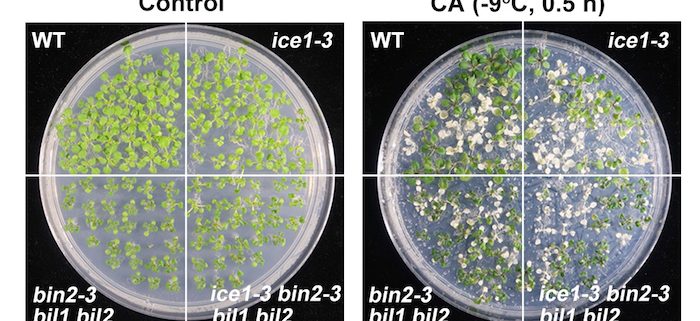How BRASSINOSTEROID-INSENSITIVE2 Negatively Regulates Freezing Tolerance
Ye et al. uncover how the kinase activity of BIN2 helps balance plant growth and cold stress responses. Plant Cell (2019) https://doi.org/10.1105/tpc.19.00058
Background: Cold stress is an environmental factor that limits the growth and geographic distribution of plants. It is important to understand how plants respond to cold stress, which would provide helpful information for breeding cold-tolerant plant varieties. Cold acclimation is one strategy used by plants to adapt to cold stress, whereby freezing tolerance increases in plants upon pre-exposure to low but non-lethal temperatures. The transcription factors CBFs (C-REPEAT BINDING FACTORs) play crucial roles in cold acclimation. Phosphorylation mediated by protein kinases has been shown to modulate plant responses to cold stress. We previously demonstrated that the GSK3-like kinase BIN2, an important kinase that participates in brassinosteroid signaling, negatively regulates freezing tolerance in plants.
Question: How does BIN2 regulate freezing tolerance in plants?
Findings: BIN2 phosphorylates the transcription factor ICE1, an important activator of CBF gene expression, and promotes its degradation during cold stress, which consequently results in attenuated cold-induced upregulation of CBFs. Moreover, the kinase activity of BIN2 decreases rapidly during the early stage of the cold stress response but is restored at the later stage. These results suggest that during the early stage of the cold stress response, the kinase activity of BIN2 is inhibited in plants, which enhances freezing tolerance via an unknown mechanism. During the later period of the cold stress response, the kinase activity of BIN2 recovers to prevent an excessive cold-stress response. This study thus reveals an important role of BIN2 in balancing plant growth and the cold stress response.
Next steps: We previously demonstrated that the protein kinases MPK3/6 also phosphorylate ICE1 and promote its degradation during cold stress. Future research should explore whether and how BIN2 and MPK3/6 coordinately act on their common substrates to modulate plant responses to environmental stresses.
Keyi Ye, Hui Li, Yanglin Ding, Yiting Shi, Chunpeng Song, Zhizhong Gong, Shuhua Yang
(2019). Brassinosteroid-insensitive2 Negatively Regulates the Stability of Transcription Factor ICE1 in Response to Cold Stress in Arabidopsis. Plant Cell 31: xxx. https://doi.org/10.1105/tpc.19.00058
Key words: Freezing tolerance, brassinosteroid, cold acclimation, protein kinase




